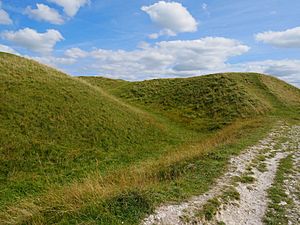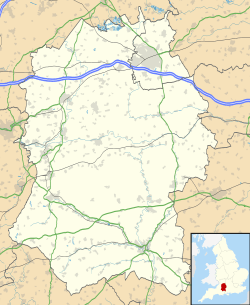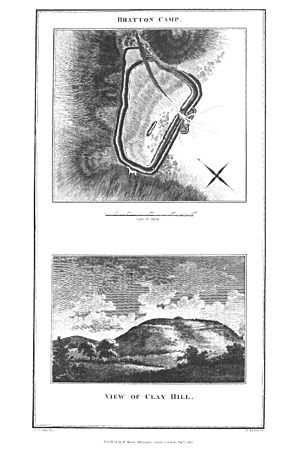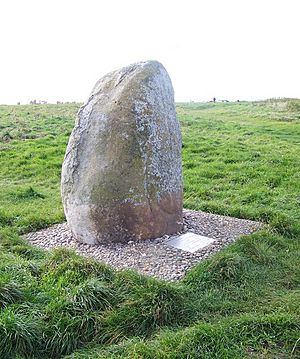Bratton Castle facts for kids

The two banks along the southern side of the hillfort
|
|
| Alternative name | Bratton Camp |
|---|---|
| Location | Wiltshire |
| Coordinates | 51°15′49″N 2°08′37″W / 51.2637°N 2.1435°W |
| Area | 25 acres (10 ha) |
| History | |
| Periods | Bronze Age, Iron Age |
| Site notes | |
| Excavation dates | yes |
| Archaeologists | William Cunnington Sir Richard Colt Hoare Jeffery Whittaker |
| Condition | good |
| Ownership | English Heritage |
| Public access | yes |
Bratton Castle, also known as Bratton Camp, is an ancient fort from the Iron Age. It was built on a hill called Bratton Down, which is on the western edge of the Salisbury Plain in Wiltshire. This fort has two big ditches and banks that form a five-sided shape, covering about 23 acres (9.3 hectares).
The famous Westbury White Horse, a large figure carved into the hillside, is located on the west side of the hill fort. It was first written about in 1742.
Contents
What is a Hill Fort?
Hill forts are ancient settlements or strongholds. They were built on hills, usually with large banks and ditches around them for protection. People started building these forts in Britain during the Late Bronze Age and Early Iron Age, around 1000 BC.
Historians and archaeologists have different ideas about why these forts were built. Some think they were military bases, perhaps to defend against invaders. Others believe they were built because more people were living in Britain, which led to arguments over land and resources. These forts would have been safe places for communities during times of conflict.
Exploring Bratton Castle
Bratton Castle is built on a steep hillside. On the west and north sides, the ground drops away sharply. Here, the ditches are stacked one above the other, and the banks rise about 5 to 6 meters (16 to 20 feet) from the bottom of the ditches. These defenses are very wide, stretching about 30 meters (98 feet) across.
On the south and part of the east side, the land is flatter. Here, the two main banks are about the same height and also around 30 meters (98 feet) wide. Some parts of the fort's outer defenses have been damaged over time by quarrying (digging for stone) or landslides. There's also a possible old entrance where the two banks separate, forming a small extra area.
Discoveries at the Fort
Archaeologists have explored Bratton Castle to learn more about its past. One of the earliest digs in Wiltshire happened here before 1775, led by Jeffery Whittaker. Although not much was written down about his findings, it's thought that Roman and Saxon coins were found nearby.
Later, famous archaeologists like William Cunnington and Sir Richard Colt Hoare also excavated the site. They dug into three burial mounds, called barrows, found inside and around the fort.
Bratton G1 (Long Barrow)
This was a long burial mound. Inside, archaeologists found two sets of cremated human remains (ashes) on a platform. There were also pebble stones, a chalk bead, pottery pieces, and animal bones. Three other burials were found closer to the top of the mound.
Bratton G2 (Bowl Barrow)
This round burial mound held two cremation urns, one placed inside the other. The larger urn was broken, but the smaller one was well-preserved. It's now in the Wiltshire Heritage Museum. This urn is special because of its unique shape and a handle with a hole in it.
Bratton G8a (Small Round Barrow)
This was a small, low burial mound. It contained a circular pit with a skeleton curled up inside, but no other objects were found with it. The skull from this skeleton is now at Cambridge Museum.
Where to Find Bratton Castle
Bratton Castle is located southwest of the village of Bratton, in the county of Wiltshire. The top of the hill is about 225 meters (738 feet) above sea level. You can easily visit the site and the surrounding hills using public footpaths.
Images for kids
 | Selma Burke |
 | Pauline Powell Burns |
 | Frederick J. Brown |
 | Robert Blackburn |





